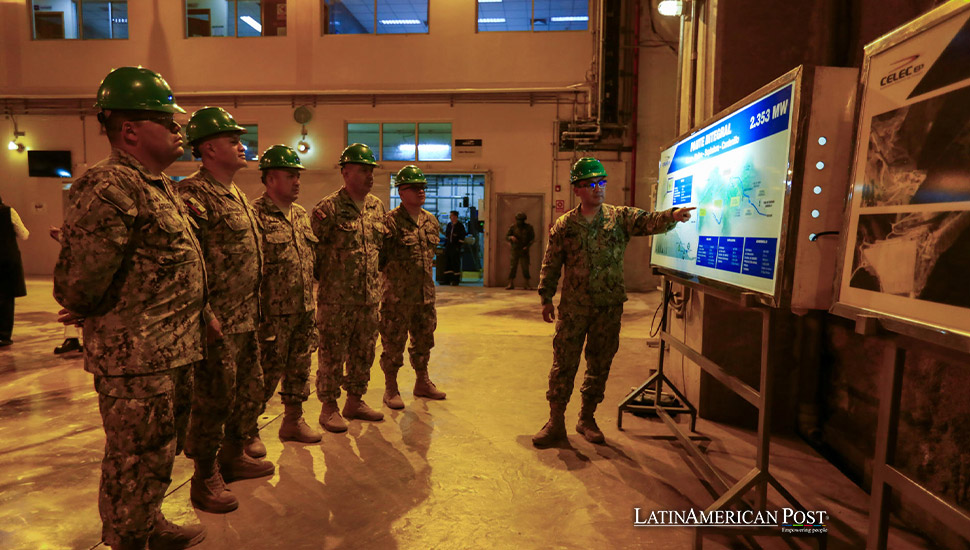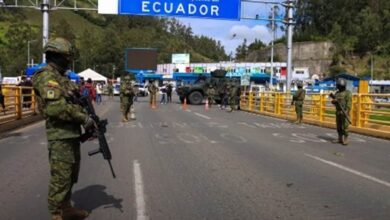Ecuador’s Plan to Fight Crime with Foreign Military Bases Sparks Sovereignty Debate

Ecuador’s President Daniel Noboa has proposed a controversial constitutional reform to allow foreign military bases back into the country. This move, aimed at combating transnational crime, could have significant geopolitical consequences for Ecuador and the wider Latin American region.
The Return of Military Bases
In a bold move, Ecuadorian President Daniel Noboa announced plans to eliminate a constitutional provision prohibiting foreign military bases on Ecuadorian soil. This provision, introduced during the administration of former President Rafael Correa, was intended to protect Ecuador’s sovereignty by banning foreign military presence and installations. Noboa, however, argues that the country’s sovereignty has already been compromised—not by foreign powers but by transnational criminal organizations, particularly those involved in drug trafficking.
Speaking from the former Manta Air Base site, where the U.S. once operated a military installation, Noboa emphasized the need for international cooperation in the fight against organized crime. He highlighted that the removal of the U.S. base in 2009 allowed criminal organizations to fill the void left behind, leading to Ecuador becoming a central hub for drug trafficking between Colombia and Peru, the world’s top producers of cocaine.
Noboa’s proposal seeks to eliminate the restrictions on foreign military bases and national military installations being used by foreign forces, arguing that Ecuador needs robust international support to combat the growing influence of drug cartels. The proposed changes, which would modify Article 5 of the Ecuadorian Constitution, have stirred debate within the country, raising questions about the delicate balance between national security and sovereignty.
Noboa’s decision to send the proposal to the National Assembly reflects his determination to push through this significant policy shift, which he argues is necessary for Ecuador to regain control over its security. His statement, “The time has shown us that past decisions only weakened our country,” encapsulates his belief that the country’s previous stance on sovereignty has left it vulnerable to the threats posed by transnational crime.
Geopolitical Implications
Ecuador’s move to invite foreign military presence back into the country could have broad geopolitical consequences for the region. The Andean nation, strategically located between Colombia and Peru, the world’s leading cocaine producers, plays a critical role in the flow of narcotics to North America and Europe. The reintroduction of foreign military bases would place Ecuador at the center of a more significant international effort to combat the global drug trade.
However, Ecuador’s neighbors may have mixed reactions to this move. Colombia, which has long been a close ally of the United States in the war on drugs, may view Ecuador’s decision favorably. Colombia has experienced firsthand the benefits and challenges of cooperating with foreign military forces, particularly the U.S. military, in its fight against the Revolutionary Armed Forces of Colombia (FARC) and drug cartels. A stronger Ecuador could help stabilize the region and reduce the flow of drugs across shared borders.
On the other hand, Peru might be more cautious in its response. While Peru has also struggled with drug cartels and illegal trafficking, its government has historically maintained a careful balance between working with international forces and protecting its sovereignty. The presence of foreign military bases in a neighboring country could shift the regional power dynamic and potentially lead to a re-evaluation of Peru’s security policies.
Furthermore, Venezuela, Ecuador’s neighbor to the north, may view Noboa’s proposal as a direct threat to its interests. Venezuela has long been suspicious of U.S. military presence in Latin America, perceiving it as a form of imperialism. If Ecuador allows foreign military bases, tensions between the two countries could rise, especially if those bases are considered part of a broader U.S. strategy to exert influence in the region.
On the global stage, Ecuador’s decision to open its doors to foreign military presence could further entrench the U.S. as a dominant player in Latin American security affairs, particularly in the war on drugs. However, it could also invite greater involvement from other international actors, such as Russia or China, which have shown growing interest in expanding their influence in Latin America. These geopolitical shifts could reshape alliances and create new tensions across the region.
Ecuador’s Stance on Sovereignty and Foreign Military Presence
Ecuador’s relationship with foreign military powers has always been a delicate one. Historically, the country has grappled with the tension between maintaining national sovereignty and engaging in international security cooperation. The Manta Air Base, operated by the U.S. from 1999 to 2009, was a key symbol of this tension. While the base was used for anti-narcotics operations, its presence was increasingly viewed as a violation of Ecuador’s sovereignty, particularly under President Rafael Correa.
When Correa came to power, he made it a priority to assert Ecuador’s independence from foreign military influence. In 2008, his government drafted a new constitution that explicitly banned foreign military bases on Ecuadorian soil. The closure of the Manta base in 2009 was seen as a victory for Ecuador’s sovereignty and a rejection of perceived U.S. dominance in the region. Correa framed the decision as reclaiming Ecuador’s independence and protecting its people from the interference of foreign powers.
However, since the base’s closure, Ecuador has faced increasing challenges in combating drug trafficking. The country’s geographic location, combined with its dollarized economy and several key ports, has made it a prime target for drug cartels seeking to move their product to lucrative markets abroad. As a result, Ecuador has seen a dramatic rise in violence and organized crime, with drug seizures reaching record highs in recent years.
In light of these challenges, Noboa’s proposal to reintroduce foreign military bases reflects a shift away from the nationalistic policies of the past. Instead of viewing foreign military presence as a threat to sovereignty, Noboa frames it as a necessary step to protect Ecuador from the far greater threat of transnational crime. This shift in perspective underscores the evolving nature of sovereignty in the face of globalization and organized crime.
Combating Crime or Compromising Sovereignty?
Noboa’s proposal has sparked intense debate within Ecuador about the trade-offs between national security and sovereignty. Proponents argue that the rise of transnational criminal organizations and the growing violence linked to drug trafficking require international cooperation. They contend that Ecuador, despite its best efforts, lacks the resources and infrastructure to combat these powerful organizations alone. Allowing foreign military bases, they argue, would give Ecuador the tools it needs to restore order and security.
Opponents, however, see Noboa’s proposal as a dangerous step backward. They argue that allowing foreign military bases would compromise Ecuador’s sovereignty and make the country overly reliant on external powers. Critics point to the historical legacy of U.S. military involvement in Latin America, where foreign bases have often been associated with imperialism, exploitation, and the undermining of local governance. For many, the idea of welcoming foreign troops onto Ecuadorian soil feels like an erosion of the hard-won independence that the country has fought for over the years.
There is also the question of whether foreign military bases are truly the solution to Ecuador’s crime problem. Some critics argue that the focus on military intervention overlooks the underlying social and economic factors that contribute to organized crime. Poverty, unemployment, and inequality create fertile ground for criminal organizations to recruit members and expand their influence. Addressing these root causes, they argue, is just as important as increasing military presence.
Furthermore, there are concerns about the potential for human rights abuses associated with foreign military operations. In other Latin American countries where foreign military forces have been involved, such as Colombia, there have been instances of civilian casualties and other human rights violations. These risks raise important ethical questions about the potential consequences of militarizing the fight against organized crime.
Ultimately, Ecuador’s decision to reintroduce foreign military bases will have far-reaching consequences, both domestically and geopolitically. While Noboa’s proposal is driven by a genuine desire to combat crime, the debate over sovereignty and foreign intervention will continue to shape Ecuador’s future—and the region’s balance of power.
Also read: Ecuador’s Massive Police Operation Strikes at Organized Crime
Ecuador’s proposal to allow foreign military bases marks a significant shift in the country’s security policy, reflecting the growing challenge of transnational crime and its impact on national sovereignty. As Ecuador grapples with this new reality, the geopolitical consequences of the decision will resonate across Latin America. While the need to combat organized crime is undeniable, the question remains whether Ecuador can balance the demands of security with the preservation of its sovereignty. The outcome of this debate will shape the country’s role in the region for years to come.





